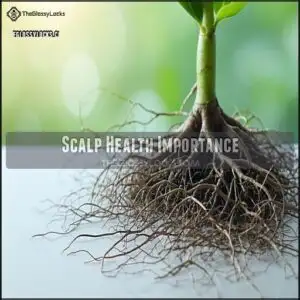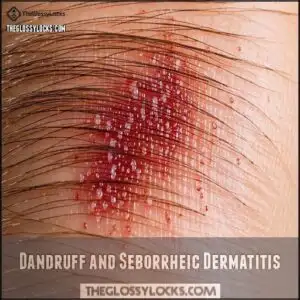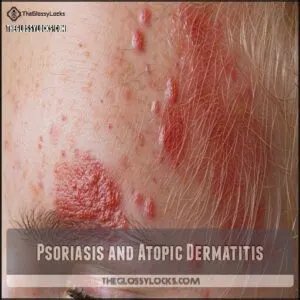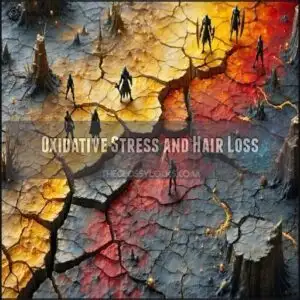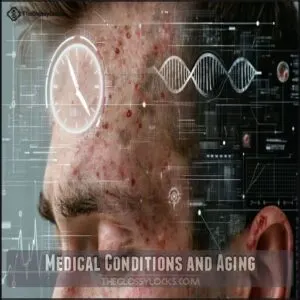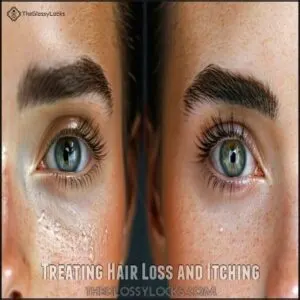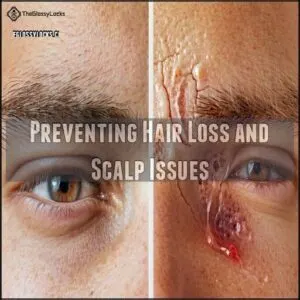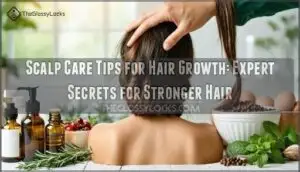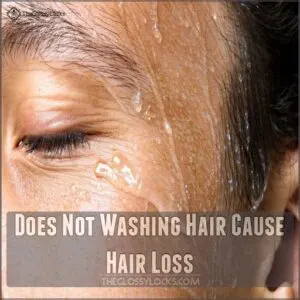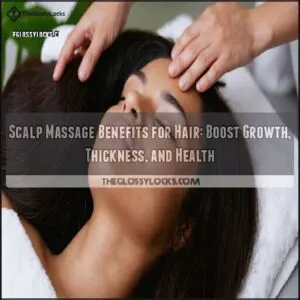This site is supported by our readers. We may earn a commission, at no cost to you, if you purchase through links.
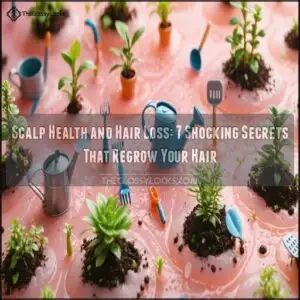
When your scalp experiences issues like dandruff, inflammation, or excess oil production, your hair follicles can’t function properly.
You’ll notice this connection when dealing with conditions like seborrheic dermatitis or oxidative stress, which often lead to thinning hair.
Genetics and hormones play significant roles too, but you can take control through proper cleansing, gentle massage, and avoiding harsh products.
The right approach to scalp care might just be the missing piece in your hair loss puzzle that most people overlook.
Table Of Contents
- Key Takeaways
- Scalp Health Importance
- Common Scalp Conditions
- Causes of Hair Loss
- Treating Hair Loss and Itching
- Preventing Hair Loss and Scalp Issues
- Frequently Asked Questions (FAQs)
- Can scalp problems cause hair loss?
- How can I improve my scalp health?
- What are the symptoms of an unhealthy scalp?
- What are the causes of itchy scalp and hair loss?
- Can alopecia cause hair loss?
- Why is scalp health so important?
- Can diet influence scalp health and hair loss?
- Is hair loss reversible with proper scalp care?
- How often should scalp treatments be applied?
- Do scalp supplements actually promote hair growth?
- Conclusion
Key Takeaways
- Your scalp’s health directly affects hair growth—inflammation, dandruff, and seborrheic dermatitis can damage follicles and disrupt your hair’s natural cycle, often leading to thinning hair.
- You’ll notice stronger, healthier hair when you maintain proper scalp care through gentle cleansing, regular massage, and avoiding harsh products that strip natural oils.
- Controlling Malassezia yeast overgrowth with specialized shampoos containing zinc pyrithione or ketoconazole can reduce oxidative stress on your follicles and prevent premature hair loss.
- You’re not just fighting genetics—your diet, stress levels, and daily habits significantly impact your scalp’s health, making many forms of hair loss reversible with early and proper treatment.
Scalp Health Importance
Your scalp’s health directly influences your hair’s growth cycle, much like soil quality determines a plant’s vitality.
You’ll notice stronger, thicker hair when you maintain proper scalp care, as it creates the ideal environment for follicles to thrive and resist premature loss, leading to a healthier scalp.
Interdependence With Hair
Think of your scalp and hair as best friends who can’t survive without each other.
Here’s a blockquote that captures the relationship between scalp and hair in an engaging way:
Your scalp and hair: inseparable allies in a lifelong journey of nourishment and protection.
Your hair provides essential scalp protection from UV rays and helps retain moisture, while your scalp creates the perfect follicle environment for hair growth.
This symbiotic relationship means that when one suffers, the other does too.
Sebum production from your scalp nourishes hair follicle health, directly impacting the quality of hair that emerges, which is a key factor in maintaining overall hair growth.
Characteristics of Healthy Scalp
Your scalp isn’t just the foundation for your hair—it’s an ecosystem that needs proper care. A healthy scalp is your ticket to beautiful, strong hair.
What makes a scalp truly healthy? Look for these telltale signs:
- Free from redness, flakiness, and irritation absence
- Balanced sebum production (not too oily, not too dry)
- Ideal microbiome balance without overgrowth
- No bumps, scabs, or excessive hair shedding
- Comfortable sensation (no itching or burning) for a healthy scalp with balanced sebum production.
Impact on Hair Growth and Quality
Your scalp’s health directly affects your hair’s growth and quality.
When your scalp microbiome is balanced, it creates an ideal environment for pre-emergent hair to develop properly.
Poor scalp health weakens hair fiber anchoring, leading to increased shedding.
You’ll notice cuticle alterations and hair shine reduction when your scalp isn’t thriving.
Like fertile soil nurtures robust plants, a healthy scalp produces stronger, shinier strands with better growth potential.
Regular scalp massages can stimulate hair follicles and improve blood flow, which helps in hair growth and overall scalp health.
Common Scalp Conditions
You’re likely experiencing common scalp conditions like dandruff, seborrheic dermatitis, or psoriasis that can substantially impact your hair growth and even lead to premature loss.
Dandruff, psoriasis, or seborrheic dermatitis silently sabotage hair growth, creating challenges for scalp health and leading to potential premature hair loss.
These conditions create oxidative stress on your follicles, basically starving your emerging hair of nutrients before it even breaks through the surface, which is a key factor in premature loss.
Dandruff and Seborrheic Dermatitis
Nearly half of adults struggle with dandruff or its severe cousin, seborrheic dermatitis.
These conditions share common dandruff causes: an overgrowth of Malassezia yeast triggering scalp inflammation and excessive skin cell turnover.
The resulting flakes and itchy scalp aren’t just embarrassing—they’re silently sabotaging your hair growth.
Treatment options targeting Malassezia’s role can dramatically improve both conditions, restoring scalp health and preventing related hair loss.
Psoriasis and Atopic Dermatitis
While dandruff can be annoying, psoriasis and atopic dermatitis take scalp inflammation to another level.
These autoimmune conditions create red, scaly patches that can feel tight, itchy, and sometimes painful.
Psoriasis triggers include stress and certain medications, while atopic symptoms often worsen in dry weather.
Both conditions damage hair follicles, potentially leading to hair loss.
Managing flare-ups requires targeted treatment options like medicated shampoos and topical steroids.
Oxidative Stress and Hair Loss
Battling oxidative stress in your scalp may be the missing key to preventing hair loss.
When free radicals damage your follicles, they accelerate scalp aging and disrupt hair growth cycles. This damage leads to cuticle damage and hair breakage you can’t ignore.
Research shows Malassezia’s role in creating lipid peroxidation compounds that weaken follicles.
Antioxidants can help combat these effects, potentially slowing the thinning process while improving overall scalp health.
Causes of Hair Loss
You’re losing your hair because of factors beyond just genetics, including hormonal shifts, medical conditions, medication side effects, and even that stressful project deadline at work.
Your scalp’s health directly impacts your hair growth cycle, with issues like inflammation and oxidative stress potentially turning your shower drain into hair’s final destination.
Heredity and Hormonal Changes
While scalp conditions can trigger hair thinning, your genetics and hormones often tell a more personal story.
Your family history plays the leading role in hereditary hair loss, known as androgenetic alopecia.
Five key elements influencing genetic and hormonal hair loss:
- DHT sensitivity in follicles (inherited trait)
- Maternal grandfather’s hair pattern
- Hormonal imbalances during pregnancy or menopause
- Male pattern baldness genes (can affect both sexes)
- Age-related hormonal shifts affecting hair thickness
Medical Conditions and Aging
Beyond genes and hormones, various medical conditions can trigger hair loss.
Your thyroid health directly impacts hair growth—both hypo and hyperthyroidism can cause thinning.
Autoimmune alopecia occurs when your body mistakenly attacks hair follicles.
As you age, hair naturally thins and changes texture, with follicles producing finer, shorter strands.
Diabetes, lupus, and other systemic diseases also contribute to hair loss by disrupting normal scalp health cycles.
Deficiencies in key nutrients, such as omega-3 fatty acids, can also lead to hair loss.
Medications and Stressful Events
While aging affects hair naturally, your medicine cabinet might be secretly sabotaging your locks.
Drug-induced alopecia can occur with chemotherapy, antidepressants, and hormonal medications.
That unexpected thinning? Stress effluvium could be the culprit.
When you’re going through emotional shock (like divorce or illness), stress hormones skyrocket, sending hair follicles into hibernation mode.
Try deep breathing techniques—your scalp health depends on managing both your medication side-effects and stress levels.
Treating Hair Loss and Itching
You’ll discover effective treatments that target both hair loss and scalp irritation through specialized shampoos containing Malassezia-inhibiting agents like zinc pyrithione.
By combining these treatments with gentle scalp massage and regular exfoliation, you’re addressing the root causes of your hair troubles while creating ideal conditions for new growth, which involves using gentle methods.
Shampoo Treatments and Scalp Care
In the context of treating hair loss, the right shampoo and scalp care routine makes all the difference.
You’ll find that specialized shampoos containing active ingredients can restore your scalp’s health while addressing hair thinning.
Here are 5 essential components of effective scalp treatments:
- Zinc pyrithione – Combats flaking and reduces hair loss
- Ketoconazole – Fights fungal infections affecting hair follicles
- Salicylic acid – Provides gentle scalp exfoliation
- Tea tree oil – Offers natural antimicrobial benefits
- Caffeine – Stimulates hair follicles during washing
Consider exploring options for ketoconazole shampoo products for treatment.
Regular massage during application enhances product absorption and improves circulation to your follicles.
Malassezia Control and Hair Growth
Fungal foes on your scalp might be stealing your hair.
Malassezia, a yeast naturally present in your scalp microbiome, can trigger oxidative stress when overgrown, damaging hair follicles and causing premature shedding.
Products containing zinc pyrithione effectively reduce Malassezia populations, minimizing hair loss while promoting healthier growth.
Studies show that controlling this fungus also improves scalp conditions and can actually increase your total visible hair count.
This yeast is a known causative factor of seborrheic dermatitis.
Gentle Scalp Massage and Exfoliation
A gentle scalp massage and regular exfoliation offer surprising benefits for your hair’s growth cycle and overall health.
When you massage your scalp, you’re not just relieving stress—you’re activating key processes for healthy hair.
Here’s how scalp massage and exfoliation boost hair growth:
- Increases blood circulation to follicles, delivering essential nutrients
- Removes dead skin cells that block product absorption
- Stimulates natural oil production for proper moisture balance
- Strengthens hair roots by improving cellular turnover
Consistent scalp massage can also provide relaxation and calm, further promoting a healthy scalp with proper moisture balance, and supporting the overall hair growth cycle, which relies on regular exfoliation.
Preventing Hair Loss and Scalp Issues
You’ll substantially reduce your risk of hair loss by establishing daily scalp care habits that minimize oxidative stress and inflammation.
Your hair’s future health depends on protecting follicles from harsh products and styling techniques that damage your scalp’s microbiome and natural protective barriers, which can lead to inflammation.
Maintaining Healthy Scalp Habits
Now that you know about treatments, let’s build lasting habits for a healthy scalp. Your daily routine matters more than you might think!
Consistent scalp care involves proper hydration (drink those eight glasses!), balanced diet rich in biotin, regular exercise to boost circulation, and quality sleep that supports hair growth.
Addressing scalp issues may require specialized scalp health solutions for ideal results.
Stress reduction through mindful practices directly impacts your scalp health, preventing hair loss while creating an environment where new strands can thrive, and it’s all about maintaining a healthy scalp and overall well-being.
Reducing Oxidative Stress and Inflammation
Now that you’ve established good scalp habits, let’s tackle those invisible enemies—oxidative stress and inflammation—that might be sabotaging your hair growth.
Your body’s natural antioxidant defenses can become overwhelmed by:
- Free radicals from UV exposure and pollution
- Malassezia yeast triggering lipid peroxidation
- Inflammatory cytokines (like IL-6) blocking follicle function
- Disrupted scalp microbiome balance
- Lifestyle factors including emotional stress
Consider using a shampoo for this condition to mitigate scalp issues. Boosting Antioxidant Scalp Care and following an anti-inflammatory diet gives your hair its best fighting chance.
Avoiding Harsh Hair Products and Styles
The aggression of harsh products lurks in your bathroom cabinet, silently damaging your scalp. Your styling choices can make or break your hair health.
Avoid sulfate-heavy shampoos and alcohol-based products that strip natural oils. Embrace gentle styling techniques and protective hairstyles instead of tight ponytails that cause traction alopecia.
Minimize heat damage prevention by using lower temperature settings and heat protectants. To maintain moisture balance, consider using sulfate-free shampoos for cleansing.
Consider chemical treatment alternatives to reduce hair loss long-term, and prioritize gentle styling techniques for optimal hair health.
Frequently Asked Questions (FAQs)
Can scalp problems cause hair loss?
Nearly 40% of individuals with scalp conditions experience hair loss.
Your scalp’s health directly impacts hair growth, as inflammation, dandruff, and seborrheic dermatitis can damage follicles and disrupt your hair’s natural growth cycle.
How can I improve my scalp health?
Regular gentle cleansing, avoiding harsh products, massaging to boost circulation, staying hydrated, reducing stress, and maintaining a balanced diet rich in vitamins can dramatically improve your scalp’s health.
And prevent future issues.
What are the symptoms of an unhealthy scalp?
You’ll notice an unhealthy scalp through itching, redness, flakiness, excessive oiliness, bumps, scabs, pain, or unusual hair loss.
These symptoms often indicate inflammation that, if untreated, could lead to permanent hair damage.
What are the causes of itchy scalp and hair loss?
Over 40% of people experience an itchy scalp during their lifetime.
Your itchy scalp and hair loss could stem from dandruff, seborrheic dermatitis, psoriasis, hormonal changes, stress, product buildup, or Malassezia yeast overgrowth.
Can alopecia cause hair loss?
Yes, alopecia is actually the medical term for hair loss itself. It comes in several forms, including androgenetic alopecia (pattern baldness), alopecia areata (patchy loss), and telogen effluvium (stress-related shedding).
Why is scalp health so important?
Like soil nurtures a garden, your scalp cradles every hair follicle.
It’s the foundation for growth, preventing issues like dandruff and inflammation that can trigger hair loss and affect overall hair quality, specifically preventing issues.
Can diet influence scalp health and hair loss?
Your diet directly impacts scalp health and hair growth. Nutrients like protein, vitamins, and minerals nourish follicles, while deficiencies can trigger hair loss. What you eat literally becomes your hair.
Is hair loss reversible with proper scalp care?
Nearly 80% of cases show hair regrowth when treated early.
You’ll see better results with proper scalp care that addresses underlying issues like inflammation, product buildup, and circulation problems affecting your follicles.
How often should scalp treatments be applied?
Apply most scalp treatments 1-2 times weekly, though this varies by condition and product type.
Daily shampoos with active ingredients like zinc pyrithione can help, while intensive treatments shouldn’t exceed recommended frequencies to prevent irritation.
Do scalp supplements actually promote hair growth?
Supplements can help if you’re deficient in certain nutrients, but they’re not miracle workers.
You’ll see better results addressing underlying issues and maintaining overall scalp health than relying solely on pills.
Conclusion
Remember, your scalp is the soil from which healthy hair springs forth.
By prioritizing your scalp health and hair loss prevention together, you’ll create the ideal environment for regrowth.
Don’t wait until you’re seeing clumps in the drain—start implementing these science-backed techniques today.
With consistent care, proper treatment of underlying conditions, and gentle handling, you’ll be amazed at how your hair responds.
Your journey to thicker, healthier locks begins with the scalp you’ve been neglecting.
- https://consultqd.clevelandclinic.org/novel-treatment-regimen-may-slow-hair-loss-promote-scalp-health
- https://www.hydrafacial.com/post/how-to-support-scalp-health-with-hydrafacial/
- https://www.healthline.com/health/beauty-skin-care/healthy-scalp
- https://nyulangone.org/conditions/hair-loss/types
- https://www.livingproof.com/hair-101/healthy-scalp-tips.html?srsltid=AfmBOoryGIwLWgqh9VJr2VAmQIgc-MeQe2pxOb7JiY1vCeY0VYB-ZPy_

